

Healthcare Social Media. Healthcare Social Media Consultants Healthcare social media isn’t a buzzword, and it’s not a trend.
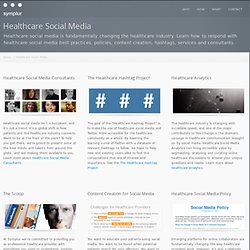
It’s a global shift in how patients and the healthcare industry connects. Social Media and the Millennial Brain. Social Media has become a double edged sword.
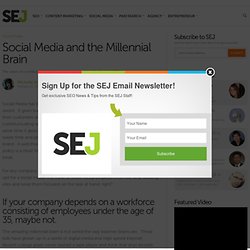
It gives businesses easy access to their customers and aids in communicating with them, but at the same time it gives employees a forum to waste time and possibly to do harm to the brand. A well thought out social media policy is a must for businesses large and small. For any company, it is very tempting to opt for a social media free zone at work. Keep employees off the time sucking sites and keep them focused on the task at hand, right? If your company depends on a workforce consisting of employees under the age of 35, maybe not. The amazing millennial brain is not wired the way boomer brains are. Tools for Understanding Social Media Marketing.
Social Media & Medicine. Social Media & Networking. Thesys Group The Data Mining Company. Virtual Communities, Social Media & Virtual Worlds. Healthcare Social Media Policy for Physicians and Staff. Emerging platforms for online collaboration are fundamentally changing the way healthcare providers work, offering new ways to engage with patients and colleagues.

It’s a new rapidly growing model for interaction which will help people to build stronger, more successful patient relationships. Symplur - Connecting the dots in healthcare social media. TweetClient. Connecting Healthcare + Social Media #HCSMny · HealthcareWen. The resource pantry. Social-media-marketing.pdf (application/pdf Object) Organize and write your novel in the cloud. Talkwheel. We have email, we have message boards, we have IM, but if they aren’t integrated with one another, our collaborative communications often fall short.
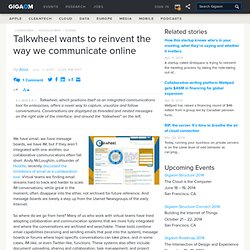
Andy McLoughlin, cofounder of Huddle, recently discussed the limitations of email as a collaboration tool. Virtual teams are finding email streams hard to track and harder to scale. IM conversations, while great in the moment, often disappear into the ether, not archived for future reference. And message boards are barely a step up from the Usenet Newsgroups of the early Internet. Visualizing a medical Twitter hashtag: MDChat. I’ve recently got in touch with an amazing group, the Thesys Group.
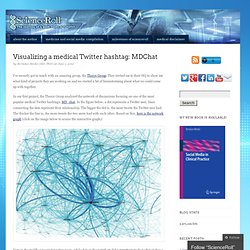
They invited me to their HQ to show me what kind of projects they are working on and we started a bit of brainstorming about what we could come up with together. In our first project, the Thesys Group analyzed the network of discussions focusing on one of the most popular medical Twitter hashtags, MD_chat. In the figure below, a dot represents a Twitter user, lines connecting the dots represent their relationship. The bigger the dot is, the more tweets the Twitter user had. How Has Online Access to Health Information Affected Consumers' Medical Knowledge? - Data Points.
#hcsmca - Healthcare Social Media Transcript and Analytics. #HCSM Twitter Leaderboard. Connecting Healthcare + Social Media #HCSMny · HealthcareWen. 14 ways social media may change doctors’ visits. In 2006, Pew Research Forum discovered that 80 percent of American adults used the Internet to research medical information.
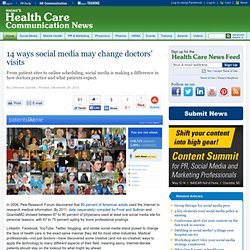
By 2011, data (separately) compiled by Frost and Sullivan and QuantiaMD showed between 87 to 90 percent of physicians used at least one social media site for personal reasons, with 67 to 75 percent opting for more professional postings. LinkedIn, Facebook, YouTube, Twitter, blogging, and similar social media stand poised to change the face of health care in the exact same manner they did for most other industries. Medical professionals—not just doctors—have discovered some creative (and not-so-creative) ways to apply the technology to many different aspects of their field, meaning savvy, Internet-literate patients should stay on the lookout for what might lay ahead. Better information and support Greater risk of compromised confidentiality More balanced drug information Better patient interaction Increased trust in the patient-doctor relationship More informed doctors. Social media: how doctors can contribute. On April 18, The General Medical Council, which regulates medical practice in the UK, opened up its draft guidance on doctors' use of social media for consultation.
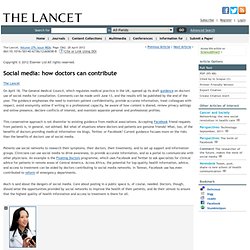
Comments can be made until June 13, and the results will be published by the end of the year. The guidance emphasises the need to maintain patient confidentiality, provide accurate information, treat colleagues with respect, avoid anonymity online if writing in a professional capacity, be aware of how content is shared, review privacy settings and online presence, declare conflicts of interest, and maintain separate personal and professional profiles. Much is said about the dangers of social media.
Care about posting in a public space is, of course, needed. Doctors warned not to use social media with patients. Network World - Doctors are being cautioned by hospitals they work with to avoid interacting with patients on social media, and that they reject any overtures by patients to interact on the likes of Facebook and Twitter.
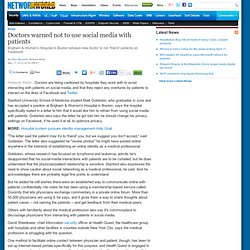
Stanford University School of Medicine student Matt Goldstein, who graduates in June and has accepted a position at Brigham & Women's Hospital in Boston, says the hospital specifically stated in a letter to him that it would like him to refrain from using social media with patients. Goldstein also says the letter he got told him he should change his privacy settings on Facebook, if he used it at all, to optimize privacy. MORE: Hospital system pursues identity management Holy Grail "The letter said the patient may try to 'friend' you, but we suggest you don't accept," said Goldstein.
The letter also suggested he "review photos" he might have posted online anywhere in the interests of establishing an online identity as a medical professional. Connecting healthcare and social media empowers doctors and patients: #HCSMNY conference. The pervasiveness of Facebook and other social media platforms has created opportunities to improve patient-physician communication.

Willing doctors can connect with patients in and outside the exam room, expanding their reach and thus jointly sharing in the empowerment this newest technology revolution offers. Doctors 2.0™ & You. Will the Future Need Doctors? – 2012 Health Foo Ignite. The following is an Ignite talk delivered at Tim O’Reilly’s 2012 Health Foo – Microsoft Research Center, Cambridge, Massachusetts.
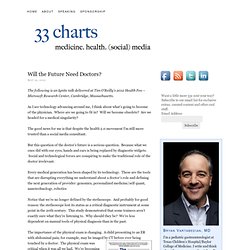
As I see technology advancing around me, I think about what’s going to become of the physician. Where are we going to fit in? Will we become obsolete? Are we headed for a medical singularity? The good news for me is that despite the health 2.0 movement I’m still more trusted than a social media consultant. But this question of the doctor’s future is a serious question. Every medical generation has been shaped by its technology. Notice that we’re no longer defined by the stethoscope. The importance of the physical exam is changing. A doctor. Clay Christensen and Jason Hwang in The Innovator’s Prescription describe the landscape of medical care as evolving on a spectrum ranging from intuitive to precise. 6 reasons physicians need to be on social media. Live tweeting, ukulele playing and numerous discussions swirling around social media and healthcare were to had throughout the Connecting Healthcare + Social Media Conference, produced by NYC Health Business Leaders, this past week in New York.
During the latter half of the day Thursday, Mike Sevilla, M.D., family physician and blogger at Family Medicine Rocks, took the stage to present not only his own social media story, but to convince other physicians why they, too, need to be on social media. "I'm in a group of four family docs and a practitioner, and yes, I do social media," said Sevilla. "What do I write about, and what's my point? What I wanted to do was bring the reader into the exam room with me … I wanted to let the reader know how difficult it is to take care of patients in this broken healthcare system. Community Connectivity Products. As payment delivery models evolve towards pay-for-outcomes, it is more critical than ever to have the tools you need to facilitate care collaboration. Interested in Accountable Care and Collaborative Care? Social Media in Healthcare Infographic. Kodak. Curation trends. Curation Market. They talk about curation!
Content Curation Links. Scoop.it - Selected Curators. "Real Curators" meeting 7.27.11. Curation in the News. Digital Aggregation and Archiving. Online Content Curation. Articles News Issues on Co.Cu. Curation2012. Pro-"Curation" Articles & Sites. Complete List of Curation Sites. General Information. WhatIsContentCuration? CURATION. Welcome to curation times? Future of Curation. Content curation. Let’s Talk About the Advantages of Content Curation. InShare6 On the first post in this series, we talked about how to get started on the road to curating content. Today I want to talk with you a little bit about why it’s beneficial to travel on that curation road.
Now, a lot of the answers are probably going to seem rather humdrum to you if you’ve read about this subject before. For example, a lot of people talk about “link love” or “link juice” when they talk about curating online content. That’s because if you format your post just so, you are giving a lot of context-rich links to the person whose post you’re curating. Why Curation Is Important to the Future of Journalism.